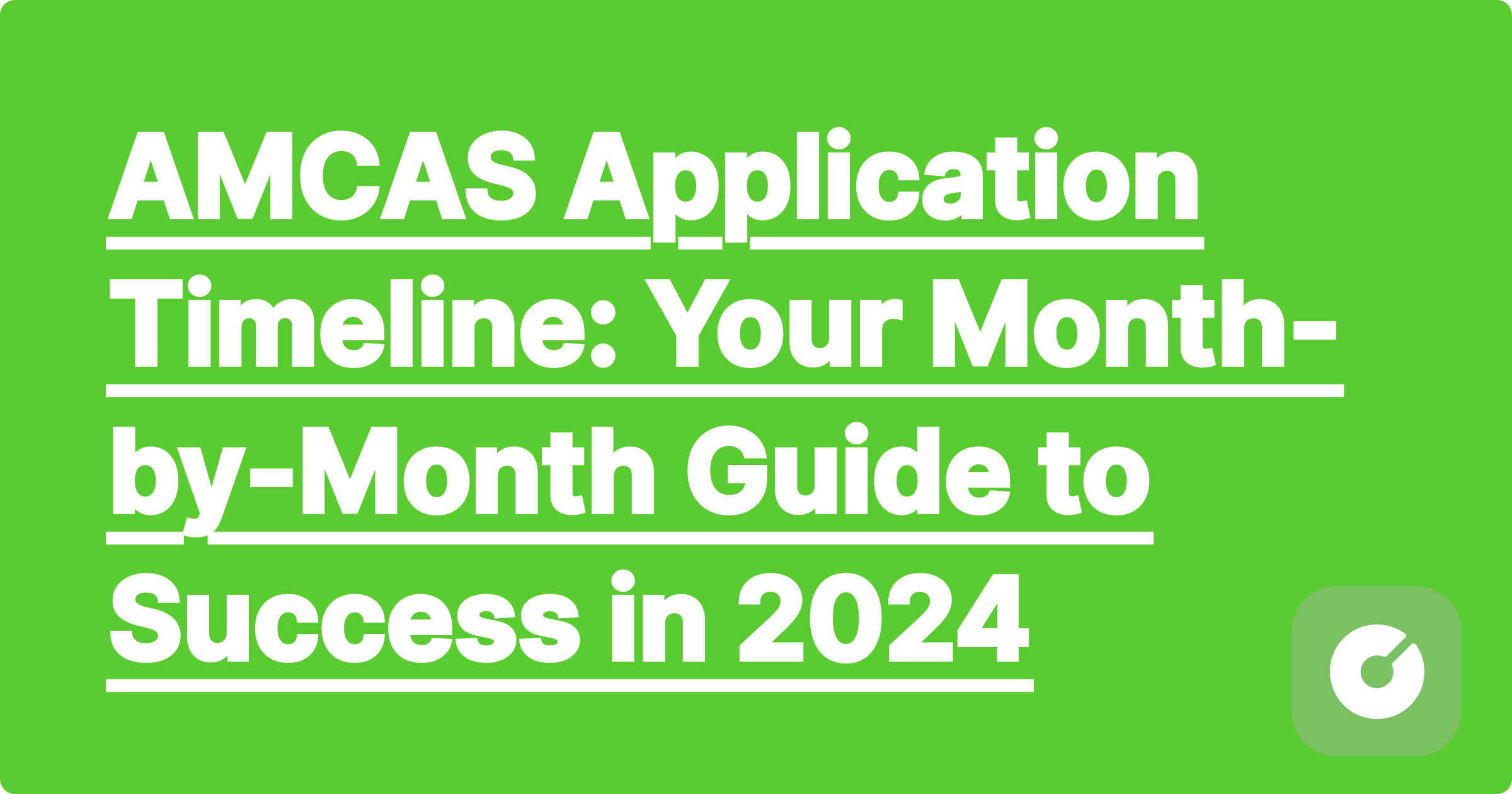
Applying to medical school is a marathon, not a sprint. The AMCAS (American Medical College Application Service) application process is notoriously rigorous, demanding meticulous planning and unwavering dedication. This comprehensive month-by-month guide will equip you with the knowledge and strategies you need to navigate this challenging journey successfully in 2024. We’ll break down the process, offering actionable tips, crucial deadlines, and cost considerations to help you maximize your chances of acceptance.
Note: While we strive for accuracy, AMCAS application timelines and requirements can change. Always refer to the official AMCAS website for the most up-to-date information. This guide reflects information available as of October 26, 2023, and is intended for the 2024 application cycle.
Before diving into the monthly breakdown, let's establish a foundational understanding. The AMCAS application serves as the central hub for your applications to participating medical schools. It requires a significant time commitment, meticulous attention to detail, and careful planning. Key components include:
Primary Application: This is the application you submit through AMCAS. It includes your personal information, academic history, MCAT score, extracurricular activities, and personal essay.
Secondary Applications: After submitting your primary application and receiving invitations, you'll complete separate secondary applications for each medical school you're interested in. These applications often include additional essays and supplemental information specific to each institution.
Interviews: Following successful review of your primary and secondary applications, you may be invited for an interview.
Acceptance/Rejection: After interviews, you'll receive acceptance or rejection notifications from the medical schools.
Note: This timeline is a general guideline. Your specific timeline may vary based on individual circumstances and school-specific deadlines.
MCAT Score Review: If you haven't already taken the MCAT, aim to schedule it for late May or early June to allow ample time for score reporting and application preparation. The average MCAT score for successful applicants varies by school but generally falls within the 510-520 range. (Note: Specific data for 2024 will be available closer to application season)
Transcript Request: Begin the process of requesting official transcripts from all undergraduate and graduate institutions attended. This can take several weeks, so early action is crucial.
Letter of Recommendation (LOR) Requests: Identify and contact potential recommenders – professors, research supervisors, or physicians – who can write strong, compelling letters of recommendation. Give them ample time (at least 2 months) and provide them with any necessary materials.
AMCAS Fee: The AMCAS application fee is approximately $170 (subject to change). Budget for this cost early on. Additionally, consider the costs of secondary applications, each ranging from $0 to upwards of $100 per school. This adds up quickly, so planning is crucial.
Start Brainstorming Essays: Begin brainstorming ideas for your personal essay and anticipate secondary application essays.
Complete AMCAS Application: July is when you should focus on meticulously completing your AMCAS application. Double-check every detail to ensure accuracy. Any errors can significantly delay the process.
Work Experience Verification: Ensure all work experience details are accurate and that you have secured verification from employers.
Finalize LORs: Follow up with your recommenders to ensure they've submitted their letters.
Submit AMCAS Application: Aim to submit your AMCAS application by early August to give yourself a head start on the secondary application process.
Begin Secondary Applications: Once your AMCAS application is verified, you'll receive invitations to complete secondary applications for the medical schools you’ve chosen. These usually involve supplemental essays and additional information specific to the school.
Complete Secondary Applications: This is a high-pressure period. Focus on completing secondary applications diligently, tailoring your responses to each school's specific requirements and values.
Interview Preparation: Begin preparing for potential interviews. Practice your responses to common interview questions and research the schools you've applied to.
Interviews: You'll likely receive interview invitations throughout this period. Prepare well and present yourself professionally.
Decisions: Acceptance and rejection notifications begin to arrive in this period. Be prepared for both outcomes and have a backup plan in place.
Sarah, a pre-med student with a 3.8 GPA and a 515 MCAT score, started her AMCAS application process in May. She diligently followed a timeline, securing LORs early, and meticulously completed her AMCAS application in July. She received invitations to several secondary applications and tailored her responses, highlighting her experiences in research and community service. Through diligent preparation, she secured interviews at several prestigious medical schools and eventually received an acceptance offer.
Start Early: The earlier you begin, the less stressed you will be.
Organize Your Documents: Create a system for tracking your documents, deadlines, and communications.
Proofread Carefully: Errors can significantly impact your application.
Seek Mentorship: Connect with current medical students or physicians for advice.
* Maintain a Balanced Life: Avoid burnout by prioritizing self-care and maintaining a healthy lifestyle.
Navigating the AMCAS application process requires careful planning, dedication, and perseverance. By following this month-by-month guide and incorporating the actionable tips provided, you can significantly improve your chances of gaining admission to your dream medical school. Remember to stay organized, proactive, and resilient throughout the process. Good luck!
Second Career Medical Students: Changing Paths to a Rewarding Career
Foreign Medical Schools for US Students: A Comprehensive Guide for 2024 and Beyond
Osteopathic Medicine: Growing Acceptance and Benefits for Aspiring Physicians
Joint Degree Programs: MD/MBA, MD/JD, MD/MPH – Your Path to a Multifaceted Career in Medicine
NIH Summer Research Programs for Pre-Med Students: Your Ultimate Guide to Success in 2024
Pre-Med Summer Programs at Top Universities: Your Guide to Success in 2024
Medical School Rejection: Your Guide to Next Steps and Reapplication Success
MCAT Study Timeline: Your 6-Month Comprehensive Plan for Success in 2024
Medical Scientist Training Programs (MSTP): Your MD/PhD Guide for 2024 and Beyond
Board Exam Preparation Timeline: Your Roadmap to USMLE Success